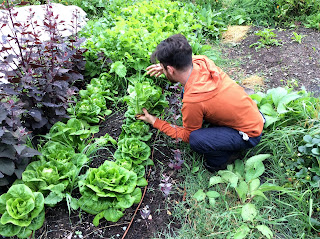How Do Your Eating Habits Impact the Environment?
Help sustain our fragile planet while you enjoy healthier, less expensive meals.
Here are some tips to get you started. Stop by the Green Tent this Sunday and learn more or share your own suggestions.
Eat foods in their original form.
No processing to degrade food value, no packaging to deplete the environment.
No processing to degrade food value, no packaging to deplete the environment.
Grow your own
Food is right outside your door. What could be more convenient? Don't have space for your own garden? Help a friend or neighbor with their crops and share the bounty.
Buy and prepare only what you need.
Learn how experts such as Kitchen Karate and My Fitness Pal help you determine the right quantities of food to purchase and prepare for your meals.
Food is right outside your door. What could be more convenient? Don't have space for your own garden? Help a friend or neighbor with their crops and share the bounty.
Buy and prepare only what you need.
Learn how experts such as Kitchen Karate and My Fitness Pal help you determine the right quantities of food to purchase and prepare for your meals.
 |
| Save Water Eat Lower on the Food Chain |
Replace beef with other forms of protein to save water, money and lives. And when you do consume animal protein, look into how it was raised. Choose farmers who use more humane practices at all stages of meat production.
Prepare and eat meals at home. You will burn about 250 calories for each meal you prepare. If you have young children, include them in all phases of the process, from menu planning to cleaning up. You will teach them a valuable skill which is empowering and a money saver.
Mar Vista resident and Green Committee Chair Jeanne Kuntz is a certified wellness coach. Stop by the Green Tent and get a free consultation on habit change. Learn more at her website, Teaching Wellness .







